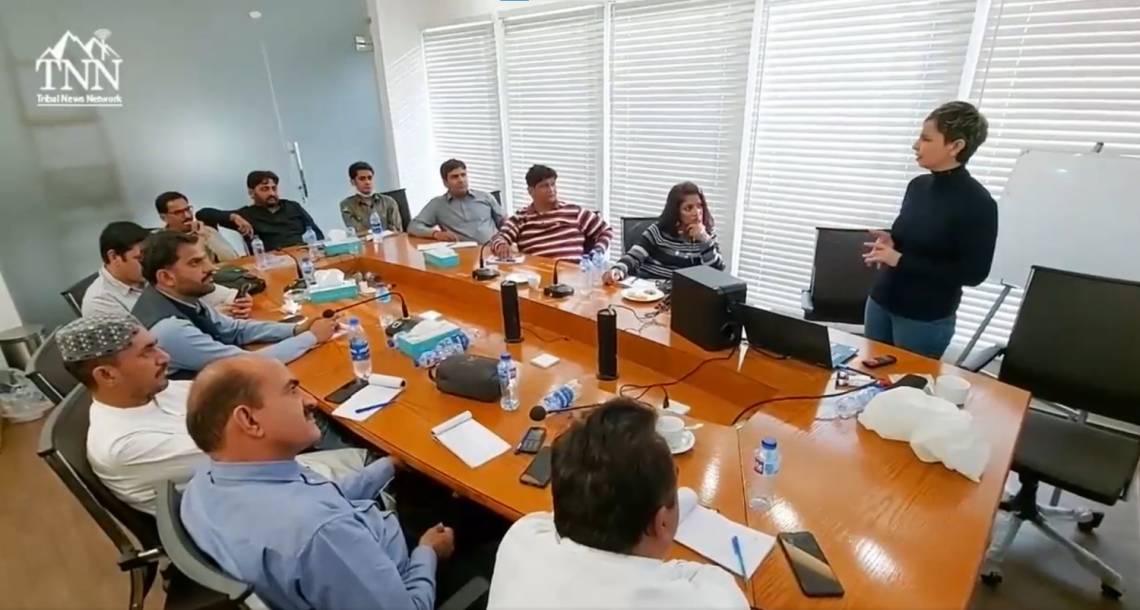Supporting the humanitarian emergency response with reliable and useful information. This is the aim of Fondation Hirondelle's project in Pakistan, created in partnership with the Pakistani agency Tribal News Network and funded by the humanitarian network H2H Network. A look back at the training courses that were given in four provinces largely affected by the floods of 2022.
Humanitarian reporting, disaster risk reduction and constructive journalism. These are the main themes of our project in Pakistan, funded by the H2H Network, during several trainings with our local partner Tribal News Network (TNN). The aim of this project is to enable the populations affected by the deadly floods that hit Pakistan in 2022 to have access to reliable information as part of the emergency humanitarian response.
The trainings were held in four provinces of the country, Balochistan, Khyber Pakhtunkhwa, Punjab and Sindh, and were attended by around 70 journalists, mainly correspondents from the flood-affected areas. Three languages, English, Urdu and Pashto, were used during the training sessions to support the participants.
While all types of media were represented (television, digital media), radio journalists made up the largest share of participants. Indeed, in humanitarian crises, radio has several advantages, such as its ease of broadcasting and its access for illiterate people.
Several topics were on the agenda during the three-day sessions. According to trainer Aurangzaib Khan, the first module of the training sessions focused on humanitarian information. "We mainly dealt with the means and ethics of humanitarian information, but also with the Sphere standards, which aim to ensure that humanitarian organisations are open, accountable and transparent about the needs they can meet" he explains.
"Particular attention has been paid to the humanitarian charter, which talks about the importance of dignity, distinguishing between armed and unarmed groups, and the principle of non-refoulement" he continues. To exemplify these elements and make local needs tangible, a humanitarian worker or government official was present when these issues were discussed.
"It seems that this series of disasters does not stop. So we decided to integrate disaster risk reduction".
With the country regularly facing humanitarian crises and climate change being felt particularly strongly in Pakistan, including the Sendai Framework for Disaster Risk Reduction in this session seemed to be of paramount importance to the trainers.
"It seems that this series of disasters does not stop. So we decided to integrate the disaster risk reduction approach" explains Aurangzaib Khan, referring to the earthquake that devastated the country in 2005, the 2010 floods and the recurrent problems and displacement of populations on the border with Afghanistan.
These modules were followed by mentoring through the production of reports. It was set up by the trainers. According to Tayyeb Afridi of Tribal News Network, many of the concepts covered were completely new to the participants. But the integration of these elements was seen as soon as the production activities started.
"They started asking questions like: "What could be done to reduce risks in a community? ". They started asking questions like: 'What could be done to reduce risks in a community? I think this is a very prompt result" explains Tayyeb Afridi. According to him, this approach to disaster risk reduction and constructive journalism also allows for a positive way of reporting, instead of highlighting problems and negative elements.
In addition to reporting at the time of the crisis, these trainings have also enabled some participants to consider covering these events in the longer term. "After the training, some participants realised that there was a large number of subjects to be covered" the trainer explains.
For example, some of the topics covered in the follow-up had a direct impact on people affected by the floods. Tayyeb Afridi gives the example of rehousing people whose houses were destroyed by the floods. The government subsidy did not allow for the reconstruction of their house. They were able to benefit from the initiative of a local association allowing affordable rehousing. The coverage of this story has helped to spread the word about this initiative and to enable other flood victims to find a home.




